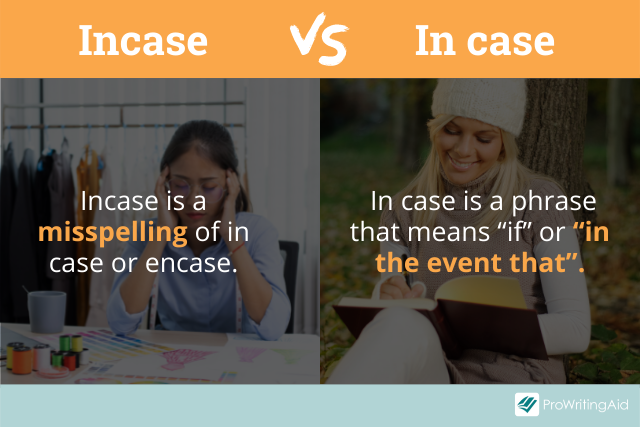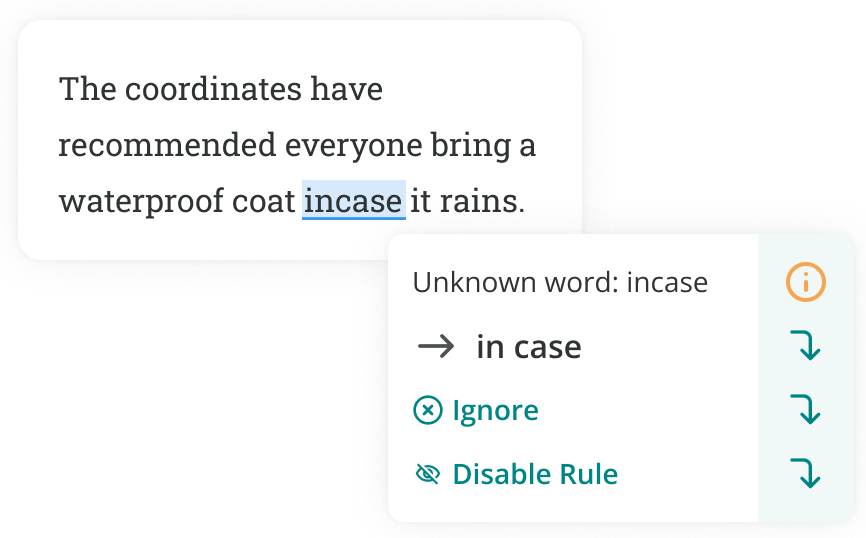
If you’re wondering whether to write in case or incase, you’re not alone. Many people mix up these two spellings.
You should always write in case, with a space separating the two words, because it is the correct spelling. Incase isn’t a real word, it’s just a misspelling of the verb encase or the phrase in case.
This article will explain how to remember the difference between incase and in case, and help you use this word correctly in your writing.
In Case Definition
In case is a phrase that means “if it’s true that” or “as a precaution against the possibility that.”
What Does In Case Mean?
We use the phrase in case to talk about something that might be true.
For example, you might say, “In case you weren’t aware, the store will be closing in fifteen minutes.” That means that you want to let someone know the store is closing, if they didn’t know that already.
We also use the phrase in case to talk about something that might happen in the future.
For example, you might say, "Don't buy a motorcycle, in case you end up with a broken leg like your cousin."
One common phrase is “just in case,” which we use to talk about expected conditions.
For example, you might say, “We should bring an umbrella, just in case it rains.” That means that you want to bring an umbrella to prepare for the possible condition of rain.

Examples of Incase vs In Case in Sentences
Let’s look at some examples of the phrase in case in a sentence.
“Everyone should be able to do one card trick, tell two jokes, and recite three poems, in case they are ever trapped in an elevator.”—Lemony Snicket, Horseradish
“I have lots of things to teach you now, in case we ever meet, concerning the message that was transmitted to me under a pine tree in North Carolina on a cold winter moonlit night.”—Jack Kerouac, The Portable Jack Kerouac
“Have you ever had so many thoughts churning inside you that you didn’t dare let them escape in case they blew you wide open?”—Ellen Hopkins, Crank
“Aim higher in case you fall short.”—Suzanne Collins, Catching Fire
“When I buy a new book, I always read the last page first, that way, in case I die before I finish, I know how it ends. That, my friend, is a dark side.”—Nora Ephron, When Harry Met Sally
“People have to talk about something just to keep their voice boxes in working order so they'll have good voice boxes in case there's ever anything really meaningful to say.”—Kurt Vonnegut, Cat’s Cradle
Just Incase or Just In Case
As I mentioned earlier, just in case is a common phrase that includes in case. Here are some examples of what that looks like in action.
“I haven't the slightest idea how to change people, but still I keep a long list of prospective candidates just in case I should ever figure it out.”—David Sedaris, Naked
“Luckily, I always travel with a book, just in case I have to wait on line for Santa, or some such inconvenience.”—David Levithan and Rachel Cohn, Dash & Lily’s Book of Dares
"Figuratively, literally, metaphorically—any way you want to look at it—everybody in L.A. keeps a bag packed. Just in case.”—Michael Connelly, The Brass Verdict
“Just in case you ever foolishly forget; I’m never not thinking of you.”—Virginia Woolf, Selected Diaries
“Hespe's mouth went firm. She didn't scowl exactly, but it looked like she was getting all the pieces of a scowl together in one place, just in case she needed them in a hurry.”—Patrick Rothfuss, The Wise Man’s Fear
Tips on Using Incase or In Case Correctly
One trick for remembering that in case has a space in it is remembering what these two words mean individually.
In case is essentially another way to say “in the case of,” so you can think of in and case as two separate words.
For example, "in case it rains" is synonymous with "in the case of rain."
The word incase isn’t a real word, it's just an incorrect spelling of in case.
The only exception is when you’re using it as a proper noun to describe the company Incase, which manufactures laptop cases.
Sometimes, people misspell the word encase as incase. Encase means “enclose or cover in a case.”
For example, you might say, "I don't have enough wrapping paper to encase this entire gift."
One mnemonic device for remembering the preferred spelling of encase is by remembering that encase means enclose, and both these words start with an E.
Therefore, if you mean enclose, you shouldn't write incase; you should write encase.
There you have it: our favorite tips and tricks for remembering incase vs in case. Don’t forget to subscribe to ProWritingAid in case you forget the correct spelling.



